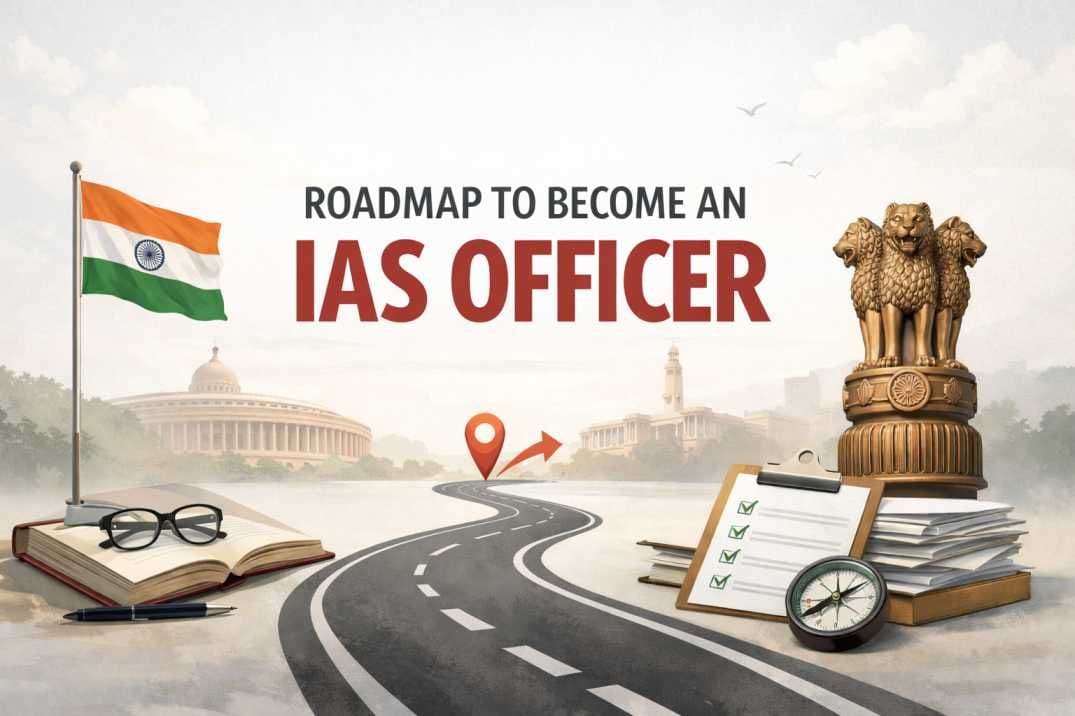How to Cover Indian Economy for UPSC: Complete Study Plan for Prelims and Mains
Oct, 2025
•6 min read
The Indian Economy is one of the most scoring and dynamic subjects in UPSC. From Prelims (GS Paper 1) MCQs to Mains (GS Paper 3) analytical answers, this subject tests your understanding of:
- Growth & development
- Government policies & schemes
- Economic challenges & solutions
- Global economic interactions
In this blog, we’ll cover how to effectively prepare Indian Economy for UPSC, including the complete syllabus for Prelims and Mains, important topics, recommended books, strategy with current affairs integration, answer writing tips, and mentor insights to help you build conceptual clarity and confidence for both stages of the exam.
Indian Economy Syllabus: UPSC Prelims and Mains
The Indian Economy syllabus for UPSC covers key concepts, policies, and current developments shaping India’s economic growth. Let’s understand the Indian Economy syllabus in detail.
UPSC Prelims Indian Economy Syllabus
The official UPSC Prelims syllabus assesses your conceptual understanding of the Indian Economy—its structure, functioning, and role in both national and global contexts. The key areas of focus include:
- Basics of Economics
- Macroeconomics
- Microeconomics
- Evolution of the Indian economy
- Economic Planning
- Planning in India
- Economic Reforms
- Inflation and Business Cycle
- Agriculture & Food Management
- Industry & Infrastructure
- Service Sector
- Indian Financial Market
- Banking in India
- Insurance in India
- Security Market in India
- External Sector in India
- International Economic Organisations
- Tax Structure in India
- Public Finance in India
- Economic Survey of India
- Union Budget
UPSC Mains Indian Economy Syllabus
The Indian Economy is a key component of the UPSC Mains General Studies Paper 3. Below is the official syllabus as given by the UPSC:
- Indian Economy and issues relating to planning, mobilisation of resources, growth, development and employment.
- Inclusive growth and issues arising from it.
- Government Budgeting.
- Major crops cropping patterns in various parts of the country, different types of irrigation, and irrigation systems storage, transport and marketing of agricultural produce and issues and related constraints; e-technology in the aid of farmers.
- Issues related to direct and indirect farm subsidies and minimum support prices; Public Distribution.
- System- objectives, functioning, limitations, revamping; issues of buffer stocks and food security;
- Technology missions; economics of animal-rearing.
- Food processing and related industries in India- scope and significance, location, upstream and downstream requirements, supply chain management.
- Land reforms in India.
- Effects of liberalisation on the economy, changes in industrial policy and their effects on industrial growth.
- Infrastructure: Energy, Ports, Roads, Airports, Railways, etc.
- Investment models.
Toppers’ Recommended Books and Resources for Indian Economy UPSC
A well-planned preparation for the Indian Economy requires a mix of conceptual clarity and real-time understanding. UPSC toppers emphasise building your foundation first and then integrating it with current affairs. Below is a list of resources for both Prelims and Mains, trusted by toppers and mentors alike.
Books and Resources for Prelims Preparation
Mentor Tip: For Prelims, focus on understanding concepts and terminologies (like fiscal deficit, inflation, repo rate) and revise with short notes before the exam.
Resources and Study Materials for Mains Preparation
The UPSC Mains (GS Paper 3) requires a deeper analytical understanding. Along with conceptual clarity, you must develop the ability to link economic theory with real-world policy and current affairs.
1. Standard Sources
- Indian Economy by Ramesh Singh
- Indian Economy Key Concepts
- Economic Survey (Latest Edition)
- Union Budget
2. Reports and Official Documents
- NITI Aayog Reports – Vision documents, growth strategies, and sustainable development plans.
- RBI Annual Report – Insights on monetary policy, inflation, and banking reforms.
- World Bank & IMF Reports – Useful for international economy linkages.
3. Current Affairs Integration
- Newspapers: The Hindu, Indian Express (Economy Section)
- SuperKalam Current Affairs: Consolidated UPSC-ready economic updates and analysis.
4. Practice and Answer Writing
- Solve Previous Year Questions (PYQs) from GS Paper 3 to understand UPSC’s analytical trend.
- Practice Mains answers weekly on key economic topics such as inclusive growth, budget reforms, infrastructure, and employment generation.
- Regularly evaluate your answers through SuperKalam Mains Evaluation to get expert feedback and improve structure, content, and presentation.
5. Additional Resources
- Monthly Economic Review (PIB)
- Yojana & Kurukshetra Magazines
Complete Preparation Strategy for UPSC Indian Economy
The Indian Economy section can be a make-or-break area in UPSC. The right strategy is built on understanding concepts, connecting them with current affairs, and practising analytical application. In this section, let’s break down the complete preparation strategy for both stages.
Preparation Strategy for Indian Economy – Prelims
1. Build Conceptual Clarity
Start with the basics before diving into advanced sources. Read NCERTs (Class 9–12 Economics) thoroughly. Focus on understanding:
- GDP, GNP, NDP, NNP
- Fiscal vs Monetary policy
- Inflation, Deflation, Stagflation
- Balance of Payments, Forex reserves
- Sectors of the economy (Primary, Secondary, Tertiary)
Mentor Tip: Don’t skip diagrams! Simple flowcharts for fiscal policy, budget cycle, or GDP components make revision faster and clearer.
2. Move to Standard Books
Once basics are clear, refer to:
- Indian Economy by Ramesh Singh (for both conceptual and factual coverage)
- Indian Economy Key Concepts by Shankar Ganesh (Prelims-friendly and crisp)
Highlight important terms, schemes, and conceptual examples. Maintain a separate notebook for:
- Definitions (e.g., Repo rate, Fiscal deficit)
- Current schemes
- Budget highlights
3. Integrate Current Affairs
Economy is the most dynamic area of Prelims — questions are often based on recent developments.
- Read The Hindu and Indian Express Economy sections daily.
- Use SuperKalam Current Affairs MCQs for simplified, UPSC-aligned questions and answers of government schemes, RBI policies, and major economic data.
- Focus on the Union Budget and Economic Survey summaries.
Mentor Tip: Link static topics with current affairs. Example: When studying “Inflation,” relate it to the latest RBI repo rate decisions or WPI trends.
4. Practice, Revise, Repeat
- Solve 10–15 years of UPSC Prelims Economy PYQs.
- Attempt sectional mock tests to identify weak areas.
- Revise short notes and mind maps regularly.
Revise keywords and numbers (like fiscal deficit %, GDP growth rate) a few days before Prelims. Questions often test your recall under pressure.
Also see: Economics MCQ for UPSC Prelims Practice
Preparation Strategy for Indian Economy – Mains
The UPSC Mains GS Paper 3 tests your ability to analyse, connect, and evaluate economic policies and outcomes.
1. Deepen Conceptual Understanding
Revisit the static concepts from Prelims but with a focus on why and how.
- Understand how fiscal policy affects inflation, or how inclusive growth impacts poverty reduction.
- Use examples from the Economic Survey, NITI Aayog, and RBI reports to add authenticity to answers.
Mentor Tip: Whenever you read about a new scheme or reform, ask yourself, “What economic problem does this solve? How does it affect growth or inequality?”
This builds analytical depth in your answers.
2. Master the Economic Survey & Budget
These two are non-negotiable for Mains.
- Use the Economic Survey to quote data, trends, and innovative terms (e.g., “K-shaped recovery”, “Formalisation of economy”).
- Read the Union Budget Summary to understand fiscal priorities, deficit management, and sectoral allocations.
Keep a short note of 5–10 key statistics to use as value-adds in Mains answers.
3. Answer Writing Strategy
UPSC expects well-structured, analytical answers. Follow this format:
Introduction → Body → Data/Examples → Analysis → Conclusion
- Start with a definition or concept.
- Use a relevant example, data, or government initiative.
- Analyse impact, benefits, and challenges.
- End with a constructive way forward or policy suggestion.
Example Question: “Discuss how fiscal policy can promote inclusive growth in India.”
Answer Approach:
- Define fiscal policy
- Link to budgetary measures (tax reforms, welfare expenditure)
- Analyse outcomes using data
- Suggest fiscal consolidation and targeted spending as a way forward
Mentor Tip: Practice at least 1–2 economy answers every week and get them evaluated through SuperKalam Mains Evaluation for expert feedback.
4. Practice with PYQs
Analyse previous years’ GS Paper 3 questions. Common recurring themes:
- Inclusive Growth and Employment
- Fiscal Policy & Budget Management
- Agricultural Reforms
- Infrastructure Development
- Global Economic Challenges
Use PYQ compilations at SuperKalam — it helps identify focus areas and question patterns.
5. Link Static + Dynamic
In Mains, the most powerful answers are those that connect static theory with real-world events. Example:
- Monetary Policy + RBI Repo Rate Hikes → Inflation control during global slowdown
- Employment + Skill India + MSME push → Inclusive growth narrative
6. Revise and Consolidate
In the final months before Mains:
- Revise your Economic Survey notes, Budget points, and SuperKalam summaries.
- Prepare data-driven introductions and conclusions.
- Use Yojana & Kurukshetra magazines for socio-economic examples and government perspectives.
Common Mistakes to Avoid While Preparing Indian Economy for UPSC
Even the most hardworking aspirants often lose marks in the Indian Economy section because of small but significant mistakes. Below are the most common pitfalls to avoid during your UPSC Indian Economy preparation:
1. Ignoring the Link Between Static and Current Affairs
Reading concepts like GDP or inflation without connecting them to recent policies or news reduces your understanding.
Tip: Always relate theory to real-world updates and government reports.
2. Memorising Schemes Without Knowing Their Purpose
Just remembering scheme names isn’t enough. UPSC asks why and how they work.
Tip: Focus on the objective, beneficiaries, and outcomes of each scheme.
3. Skipping Data from the Economic Survey
The Economic Survey provides valuable data and insights that enrich your answers.
Tip: Note key statistics, terms, and graphs to use in Mains answers.
4. Avoiding Mains Answer Practice
Reading alone won’t help in Mains. Practice sharpens analysis and presentation.
Tip: Write 1–2 GS Paper 3 answers weekly.
5. Underestimating Prelims Trends
UPSC Prelims questions test application, not rote memory.
Tip: Solve at least the last 10 years’ PYQs to understand patterns and recurring concepts.
Avoiding these mistakes will make your preparation smarter and more result-oriented.
Final Thoughts
Preparing for the Indian Economy in UPSC is about understanding how the economy breathes, functions, and impacts people’s lives. Every topper you admire once started where you are today — uncertain, anxious, yet determined. The difference lies in discipline, clarity, and perseverance.
Keep learning, keep believing, and remember: Clarity creates confidence — and confidence cracks UPSC.
Must read: How to Start UPSC Exam 2026 Preparation: A Complete Guide to Success
Start Your UPSC Journey Smarter with SuperKalam
Crack UPSC with AI-powered guidance, personalised feedback, PYQs and expert-curated notes — all in one platform.
Join SuperKalam Today and take your preparation to the next level!
Crack UPSC with your Personal AI Mentor
An AI-powered ecosystem to learn, practice, and evaluate with discipline
Download Now


